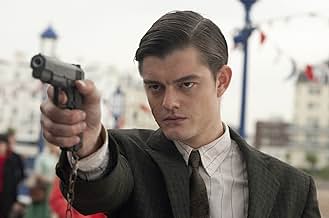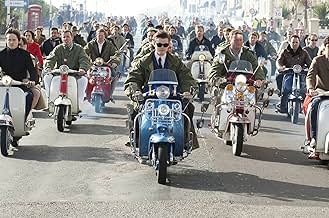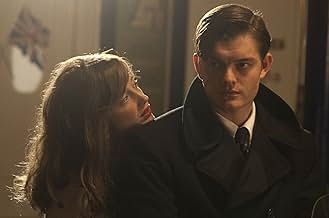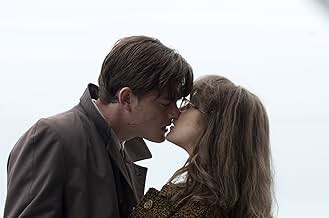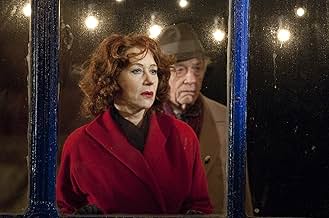VALUTAZIONE IMDb
5,7/10
6915
LA TUA VALUTAZIONE
Traccia la caduta a capofitto di Pinkie, un'adolescente svantaggiata che brandisce un rasoio con un religioso desiderio di morte.Traccia la caduta a capofitto di Pinkie, un'adolescente svantaggiata che brandisce un rasoio con un religioso desiderio di morte.Traccia la caduta a capofitto di Pinkie, un'adolescente svantaggiata che brandisce un rasoio con un religioso desiderio di morte.
- Premi
- 1 vittoria e 8 candidature totali
Phil Davis
- Spicer
- (as Philip Davis)
Recensioni in evidenza
A really big step in the career of Richard Attenborough came when he starred in the first film of Graham Greene's novel Brighton Rock. It was so good you'd think no one would try and top it, but in 2010 the story was filmed again and the time of the story updated from post war Great Britain to the swinging sixties and the riots between the Mod and Rocker teens. That is the background for young Sam Riley to try and take a really big step in the rackets.
Which are pretty much the same as they are here although it is rare that guns are used as per the culture. Sam Riley in the lead role that helped give a boost to Richard Attenborough's career is an amoral young man who gets involved in a homicide. A revenge killing really, but a young woman who works in Helen Mirren's store can finger him for the crime.
What to do but woo Andrea Riseborough and marry her so she can't testify against him. But when Riley's crew leans on Mirren's friend John Hurt at his place of business and the guy that Riley killed was Mirren's boyfriend she'll do what it takes to take Riley down.
Some nice shots of Brighton which is like Atlantic City here, a rather run down resort area, or at least Atlantic City was before the casinos arrived. Riley, Riseborough, Mirren, and Hurt do quite well by their roles.
There is a really nice performance by Andy Serkis as a rather flamboyant gay gangster who is head of the other mob. He checks out Riley like a slab of beef on the rack at the butcher shop, but he doesn't let his lust get in the way of squelching a rival.
There's also a little more of the Catholicism of Graham Greene in the plot than there was in the first film. Even as amoral a young man as Riley does get guilt tripped quite a bit for the advantage he takes of Riseborough.
Not a bad film, but not up to what Richard Attenborough starred in.
Which are pretty much the same as they are here although it is rare that guns are used as per the culture. Sam Riley in the lead role that helped give a boost to Richard Attenborough's career is an amoral young man who gets involved in a homicide. A revenge killing really, but a young woman who works in Helen Mirren's store can finger him for the crime.
What to do but woo Andrea Riseborough and marry her so she can't testify against him. But when Riley's crew leans on Mirren's friend John Hurt at his place of business and the guy that Riley killed was Mirren's boyfriend she'll do what it takes to take Riley down.
Some nice shots of Brighton which is like Atlantic City here, a rather run down resort area, or at least Atlantic City was before the casinos arrived. Riley, Riseborough, Mirren, and Hurt do quite well by their roles.
There is a really nice performance by Andy Serkis as a rather flamboyant gay gangster who is head of the other mob. He checks out Riley like a slab of beef on the rack at the butcher shop, but he doesn't let his lust get in the way of squelching a rival.
There's also a little more of the Catholicism of Graham Greene in the plot than there was in the first film. Even as amoral a young man as Riley does get guilt tripped quite a bit for the advantage he takes of Riseborough.
Not a bad film, but not up to what Richard Attenborough starred in.
BRIGHTON ROCK is a British remake of the 1947 brilliant film noir based on the novel by Graham Greene an adapted for the screen by Graham Greene and Terrance Rattigan. This BRIGHTON ROCK has been updated from the original 1930s setting to the 1960s and the screenplay is by Rowan Joffe (who also directs) - tough competition with the original writers! The result is a dark film that relies on performances by some actors who are not up to the task and makes them seem even more weak by the presence of such brilliant actors in smaller roles as Helen Mirren, John Hurt, Philip Davis and Andrea Riseborough.
The story takes place in 1964 in Brighton, once a quiet seaside town, is suddenly overrun by gangs of sharp suited Mods and greasy Rockers looking for a riot. Looking to be the top Mod gangster, Pinkie Brown (Sam Riley) will stop at nothing to be the biggest name in the crime world - bigger than the competitor Colleoni (Andy Serkis). Pinkie witnesses the vicious death of fellow Mod Kite (Goeff Bell) and is determined to kill the perpetrator Hale (Sean Harris). Pinkie's ruthless and violent ambition takes over his mission and when he discovers that a waitress named Rose (Andrea Riseborough) who works at Snows, a café run by Ida (Helen Mirren), is involved tangentially in the murders, Pinkie decides to court the plain Jane Rose, knowing that if he marries her she cannot testify against him should she discover Pinkie's guilt in the murders. Ida had a 'connection' with Hale and sees through the veils of deceit Pinkie is placing on the innocent Rose, and she and her longtime friend Phil (John Hurt) undermine Pinkie's plans. Pinkie marries Rose - a gesture that secures Rose's fascination and new love for Pinkie - to keep her from testifying against him. As factors around the conflicts between the two gangs tighten and Pinkie fears for his end, he convinces his new bride to take part in a mutual suicide, an act that has a surprising end.
What is missing in this updated adaptation is Graham Greene's important emphasis on the theme of sin, guilt and Catholicism: there are attempts to bring these concepts into the script but they become of lesser importance than the action and dark evocation of a period piece. There mood is well described by the cinematography of John Mathieson, but the single most effective aspect of this film is the brilliant music score by the gifted British composer Martin Phipps, godson of Benjamin Britten. Were there not an original film for comparison the film would likely be better accepted. But for those who are ardent fans of the novels of Graham Greene this film adaptation will likely disappoint. It is currently available On Demand and simultaneously in theaters before the DVD is released here.
Grady Harp
The story takes place in 1964 in Brighton, once a quiet seaside town, is suddenly overrun by gangs of sharp suited Mods and greasy Rockers looking for a riot. Looking to be the top Mod gangster, Pinkie Brown (Sam Riley) will stop at nothing to be the biggest name in the crime world - bigger than the competitor Colleoni (Andy Serkis). Pinkie witnesses the vicious death of fellow Mod Kite (Goeff Bell) and is determined to kill the perpetrator Hale (Sean Harris). Pinkie's ruthless and violent ambition takes over his mission and when he discovers that a waitress named Rose (Andrea Riseborough) who works at Snows, a café run by Ida (Helen Mirren), is involved tangentially in the murders, Pinkie decides to court the plain Jane Rose, knowing that if he marries her she cannot testify against him should she discover Pinkie's guilt in the murders. Ida had a 'connection' with Hale and sees through the veils of deceit Pinkie is placing on the innocent Rose, and she and her longtime friend Phil (John Hurt) undermine Pinkie's plans. Pinkie marries Rose - a gesture that secures Rose's fascination and new love for Pinkie - to keep her from testifying against him. As factors around the conflicts between the two gangs tighten and Pinkie fears for his end, he convinces his new bride to take part in a mutual suicide, an act that has a surprising end.
What is missing in this updated adaptation is Graham Greene's important emphasis on the theme of sin, guilt and Catholicism: there are attempts to bring these concepts into the script but they become of lesser importance than the action and dark evocation of a period piece. There mood is well described by the cinematography of John Mathieson, but the single most effective aspect of this film is the brilliant music score by the gifted British composer Martin Phipps, godson of Benjamin Britten. Were there not an original film for comparison the film would likely be better accepted. But for those who are ardent fans of the novels of Graham Greene this film adaptation will likely disappoint. It is currently available On Demand and simultaneously in theaters before the DVD is released here.
Grady Harp
Hearing the news that John Boulting's classic 1946 adaptation of Graham Greene's novel Brighton Rock was to be remade filled with me trepidation. The current spate of mostly inferior remakes are one thing but meddling with the perfection of this archetypical gangster film is another. How can any updated version possibly replace the indelible image of the 23 year old Richard Attenborough as the flick knife wielding baby faced assassin Pinkie Brown? As filming began and rumours of a 1960s Mods and Rockers setting emerged I began to have serious doubts if this remake was really going to be a good idea! Thankfully fears that Rowan Joffe's Brighton Rock is a sanitised version of the story are quickly allayed. The relocation of Brighton Rock to the 1960s does not mean that we are entering into the trendy youth culture of the era or being taken on an adolescent search for identity. The sharp-suited posers and greasy leather clad Rockers are merely a backdrop to a much darker reality as we are taken into a terrifying world of crime, guilt and inner-torment.
Brighton Rock is concerned with the concepts of good versus evil, sin and redemption they were present in Greene's novel, the 1946 adaptation and once again are central in Rowan Joffe's remake. However, additional scenes and alterations to the 2010 update mean that Pinkie's progressively violent behaviour is almost justified. In the exhilarating opening sequence Pinkie witnesses the brutal murder of the gang's original leader Kite when Fred Hale slashes his throat. When Pinkie sees one of the few role models in his life burbling and drowning in his own blood revenge it seems is not only on the cards but unavoidable. This kind of black and white, eye for an eye, morality detracts from the original story where Pinkie Brown's vicious streak appeared to be innate and a product of original sin. The character of Ida Arnold (Dame Helen Mirren) also has undergone a significant adjustment. In opposition to the Catholicism of Pinkie and Rose the pleasure seeking Ida was concerned only with the here and now. Mirren's portrayal plays these aspects down resulting in a more serious role and a lessening of the story's theological study.
As with Attenborough before him Sam Riley's Pinkie is intense, dangerous and teeters on the edge of sanity. If anything in Joffe's adaptation Pinkie Brown undergoes a broader transformation than before as greater emphasis being placed upon his journey from a nervous lackey to maniacal gang leader. Unfortunately the 30 year old Riley he does not resemble a juvenile delinquent. Therefore the shy adolescent awkwardness that Pinkie displays towards adulthood and in particular his relationship with Rose, (conveyed so expertly by Attenborough,) is absent.
Andrea Riseborough gives an outstanding performance as Rose she too goes on a psychological journey from being a naive and mousey youngster to an assertive young woman attracted to Pinkie's confidence and menace. The scene in which Pinkie in effect buys Rose from her abusive father for £150 adds a social realist dimension to the film uncovering the lack of options available to a young working-class woman in 'sixties Britain. The squalid surroundings of Pinkie and Rose's flat complete with peeling wallpaper, scuffed furniture and squeaky floorboards are also reminiscent of a Kitchen Sink drama. There is some impressive cinematography by John Mathieson as the camera pans from the threatening crashing waves on Brighton Beach to the scenic seaside cafés foreshadowing the storm that is building. The swelling orchestral soundtrack also adds to the heightened sense of panic and drama. The tea rooms, arcades and dance-halls of 1960s Brighton are also accurately recreated as are the neglected interiors of the boarding houses. And yet There is something oddly unreal about Joffe's Brighton Rock partly down to the unnecessary time shift which does nothing but confuse the audience. The film's characters seem stuck in the wrong era originating as they do from austere post-war Britain both in appearance and behaviour. Using the Mods and Rockers backdrop and casting of Philip Davis, (who appeared in Quadrophenia,) as Spicer turns the movie into a pastiche of sorts leaving us with a souped-up hyper-reality. This is Brighton as seen through the eyes of the cinema goer not the world of Graham Greene's novel. Dark, menacing and suspenseful Rowan Joffe's Brighton Rock is well worth seeing it is just unfortunate that the film is not as good as the sum of its parts.
Brighton Rock is concerned with the concepts of good versus evil, sin and redemption they were present in Greene's novel, the 1946 adaptation and once again are central in Rowan Joffe's remake. However, additional scenes and alterations to the 2010 update mean that Pinkie's progressively violent behaviour is almost justified. In the exhilarating opening sequence Pinkie witnesses the brutal murder of the gang's original leader Kite when Fred Hale slashes his throat. When Pinkie sees one of the few role models in his life burbling and drowning in his own blood revenge it seems is not only on the cards but unavoidable. This kind of black and white, eye for an eye, morality detracts from the original story where Pinkie Brown's vicious streak appeared to be innate and a product of original sin. The character of Ida Arnold (Dame Helen Mirren) also has undergone a significant adjustment. In opposition to the Catholicism of Pinkie and Rose the pleasure seeking Ida was concerned only with the here and now. Mirren's portrayal plays these aspects down resulting in a more serious role and a lessening of the story's theological study.
As with Attenborough before him Sam Riley's Pinkie is intense, dangerous and teeters on the edge of sanity. If anything in Joffe's adaptation Pinkie Brown undergoes a broader transformation than before as greater emphasis being placed upon his journey from a nervous lackey to maniacal gang leader. Unfortunately the 30 year old Riley he does not resemble a juvenile delinquent. Therefore the shy adolescent awkwardness that Pinkie displays towards adulthood and in particular his relationship with Rose, (conveyed so expertly by Attenborough,) is absent.
Andrea Riseborough gives an outstanding performance as Rose she too goes on a psychological journey from being a naive and mousey youngster to an assertive young woman attracted to Pinkie's confidence and menace. The scene in which Pinkie in effect buys Rose from her abusive father for £150 adds a social realist dimension to the film uncovering the lack of options available to a young working-class woman in 'sixties Britain. The squalid surroundings of Pinkie and Rose's flat complete with peeling wallpaper, scuffed furniture and squeaky floorboards are also reminiscent of a Kitchen Sink drama. There is some impressive cinematography by John Mathieson as the camera pans from the threatening crashing waves on Brighton Beach to the scenic seaside cafés foreshadowing the storm that is building. The swelling orchestral soundtrack also adds to the heightened sense of panic and drama. The tea rooms, arcades and dance-halls of 1960s Brighton are also accurately recreated as are the neglected interiors of the boarding houses. And yet There is something oddly unreal about Joffe's Brighton Rock partly down to the unnecessary time shift which does nothing but confuse the audience. The film's characters seem stuck in the wrong era originating as they do from austere post-war Britain both in appearance and behaviour. Using the Mods and Rockers backdrop and casting of Philip Davis, (who appeared in Quadrophenia,) as Spicer turns the movie into a pastiche of sorts leaving us with a souped-up hyper-reality. This is Brighton as seen through the eyes of the cinema goer not the world of Graham Greene's novel. Dark, menacing and suspenseful Rowan Joffe's Brighton Rock is well worth seeing it is just unfortunate that the film is not as good as the sum of its parts.
7rbrb
This is a dark,intense 'film noir' type drama.
The backdrop to it is Brighton, England of the 1960's with rebelling youth(mods and rockers).The actual story is about a young murderous psychopath thug involved in a gang war. A gullible waitress unwittingly becomes a witness to murder and the thug needs to deal with it.
The movie is atmospheric and grim. No hint of much happiness nor any likable characters.Everyone in the movie is flawed in one way or another. Maybe that is why many people did not rate this movie highly.
There is a religious and moral agenda in this picture which if recognized may disturb some viewers.
I thought all the main actors gave edgy and compelling performances. The 2 leads namely Sam Riley and Andrea Riseborough are outstanding with on balance the latter stealing the show.
The very last scene in the film is brilliant and thought provoking.
7/10
The backdrop to it is Brighton, England of the 1960's with rebelling youth(mods and rockers).The actual story is about a young murderous psychopath thug involved in a gang war. A gullible waitress unwittingly becomes a witness to murder and the thug needs to deal with it.
The movie is atmospheric and grim. No hint of much happiness nor any likable characters.Everyone in the movie is flawed in one way or another. Maybe that is why many people did not rate this movie highly.
There is a religious and moral agenda in this picture which if recognized may disturb some viewers.
I thought all the main actors gave edgy and compelling performances. The 2 leads namely Sam Riley and Andrea Riseborough are outstanding with on balance the latter stealing the show.
The very last scene in the film is brilliant and thought provoking.
7/10
The main character of this movie is Pinkie Brown, a small-time thug in Brighton, England, in the 1960s. Pinkie's true evil nature comes out when he tries to take over a small gang of criminals after their leader had been killed by a rival gang. As played here, Pinkie is in his 20s and, as brash and amoral as he is, he and his mediocre cohorts are no match for the rival gang that basically runs underground crime in Brighton.
The action is sordid and ugly, but the glossy color photography works at cross purposes to conveying that mood. Much of the photography is more appropriate for an art film than for this down-and-dirty fare, making me think that maybe black and white would have been a more appropriate choice. As Pinkie, I found Sam Riley just a little too handsome for the part--he does not exude the menace and harsh personality that is Pinkie's nature.
I found the initial setup scenes rapid-paced and confusing, requiring close attention; if you don't follow what has happened early on, you will be at a loss to fully understand what happens later. An additional complication to my following the opening scenes was the fact that I am not a Brit and didn't always follow the cadences and clipped manner of speaking. I confess to starting the movie over after about fifteen minutes, with English subtitles turned on. That was a great help.
The score that often seems to aspire to the transcendent seems greatly out of place.
I wish I had seen this movie before having read the book, since having some of the images in mind would have been good. Never having been to Brighton, my mental picture of it would have been greatly enhanced by what is well captured here. While the movie strips from the book much of the depth of the themes of sexuality, morality, loyalty, and sin, there are things in the movie that I found improved upon the book. I liked Helen Mirren's portrayal of Ida as a more centered person than the blithe Ida of the book, and John Hurt fleshed out Ida's friend Phil better than what I got from the book. And there are a lot of little things. For example, I pictured the candy, Brighton rock, as being something like a candy cane rather than the weighty rod seen in the movie. I regret that Pinkie's lawyer Prewitt was deleted--he was a truly Dickensian character in the book. And why the great ending in the book was changed is beyond me.
The action is sordid and ugly, but the glossy color photography works at cross purposes to conveying that mood. Much of the photography is more appropriate for an art film than for this down-and-dirty fare, making me think that maybe black and white would have been a more appropriate choice. As Pinkie, I found Sam Riley just a little too handsome for the part--he does not exude the menace and harsh personality that is Pinkie's nature.
I found the initial setup scenes rapid-paced and confusing, requiring close attention; if you don't follow what has happened early on, you will be at a loss to fully understand what happens later. An additional complication to my following the opening scenes was the fact that I am not a Brit and didn't always follow the cadences and clipped manner of speaking. I confess to starting the movie over after about fifteen minutes, with English subtitles turned on. That was a great help.
The score that often seems to aspire to the transcendent seems greatly out of place.
I wish I had seen this movie before having read the book, since having some of the images in mind would have been good. Never having been to Brighton, my mental picture of it would have been greatly enhanced by what is well captured here. While the movie strips from the book much of the depth of the themes of sexuality, morality, loyalty, and sin, there are things in the movie that I found improved upon the book. I liked Helen Mirren's portrayal of Ida as a more centered person than the blithe Ida of the book, and John Hurt fleshed out Ida's friend Phil better than what I got from the book. And there are a lot of little things. For example, I pictured the candy, Brighton rock, as being something like a candy cane rather than the weighty rod seen in the movie. I regret that Pinkie's lawyer Prewitt was deleted--he was a truly Dickensian character in the book. And why the great ending in the book was changed is beyond me.
Lo sapevi?
- QuizPhil Davis (Frank Spicer) previously played the mod Chalky in Quadrophenia (1979), which was likewise set in Brighton in 1964.
- BlooperWhen Rose opens the record player, it has a modern British plug on it. In 1960s Britain plug pins were round. Safety switches wall sockets would not have been in place at this time, either.
- ConnessioniFeatured in Breakfast: Episodio datato 28 gennaio 2011 (2011)
I più visti
Accedi per valutare e creare un elenco di titoli salvati per ottenere consigli personalizzati
- How long is Brighton Rock?Powered by Alexa
Dettagli
- Data di uscita
- Paesi di origine
- Sito ufficiale
- Lingua
- Celebre anche come
- Băng Đảng Brighton
- Luoghi delle riprese
- Aziende produttrici
- Vedi altri crediti dell’azienda su IMDbPro
Botteghino
- Budget
- 12.000.000 USD (previsto)
- Lordo Stati Uniti e Canada
- 229.653 USD
- Fine settimana di apertura Stati Uniti e Canada
- 32.774 USD
- 28 ago 2011
- Lordo in tutto il mondo
- 2.913.599 USD
- Tempo di esecuzione
- 1h 51min(111 min)
- Colore
- Mix di suoni
- Proporzioni
- 2.39 : 1
Contribuisci a questa pagina
Suggerisci una modifica o aggiungi i contenuti mancanti





